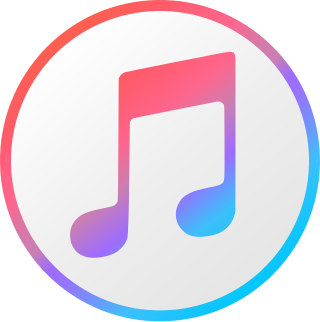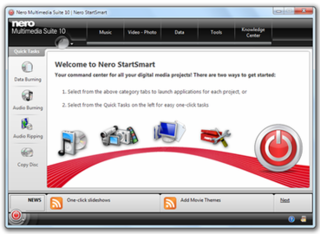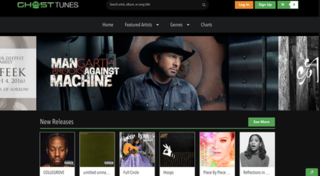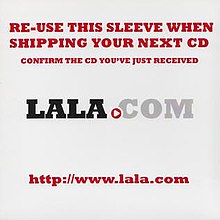
iTunes was a media player, media library, mobile device management utility developed by Apple. It was used to purchase, play, download and organize digital multimedia on personal computers running the macOS and Windows operating systems, and can be used to rip songs from CDs as well as playing content from dynamic, smart playlists. It includes options for sound optimization and wirelessly sharing iTunes libraries.

A digital music store is a business that sells digital audio files of music recordings over the Internet. Customers gain ownership of a license to use the files, in contrast to a music streaming service, where they listen to recordings without gaining ownership. Customers pay either for each recording or on a subscription basis. Online music stores generally also offer partial streaming previews of songs, with some songs even available for full length listening. They typically show a picture of the album art or of the performer or band for each song. Some online music stores also sell recorded speech files, such as podcasts, and video files of movies.
Stamps.com is a brand and the former corporate name of Auctane, an American company that provides Internet-based mailing and shipping services. Until its acquisition by Thoma Bravo, Stamps.com was a public company traded on the NASDAQ exchange under the symbol STMP. The company's main offices are located in Austin, Texas.

Nero Platinum Suite is a software suite for Microsoft Windows that is developed and marketed by Nero AG. Version 2017 of this product was released in October 2016.
Ripping is the extraction of digital content from a container, such as a CD, onto a new digital location. Originally, the term meant to rip music from Commodore 64 games. Later, the term was applied to ripping WAV or MP3 files from digital audio CDs, and after that to the extraction of contents from any storage media, including DVD and Blu-ray discs, as well as the extraction of video game sprites.

eMusic is an online music and audiobook store that operates by subscription. In exchange for a monthly subscription eMusic users can download a fixed number of MP3 tracks per month. eMusic was established in 1998, is headquartered in New York City with an office in London, and is owned by TriPlay.

WOXY.com was a modern rock internet radio station based in Oxford, Ohio, and later Austin, Texas. WOXY.com relied mainly on its own website to reach its listeners. WOXY.com programming at one time was also available at lala.com and WVXU HD Radio.

The music industry refers to the individuals and organizations that earn money by writing songs and musical compositions, creating and selling recorded music and sheet music, presenting concerts, as well as the organizations that aid, train, represent and supply music creators. Among the many individuals and organizations that operate in the industry are: the songwriters and composers who write songs and musical compositions; the singers, musicians, conductors, and bandleaders who perform the music; the record labels, music publishers, recording studios, music producers, audio engineers, retail and digital music stores, and performance rights organizations who create and sell recorded music and sheet music; and the booking agents, promoters, music venues, road crew, and audio engineers who help organize and sell concerts.

MediaMonkey is a digital media player and media library application developed by Ventis Media Inc., for organizing and playing audio on Microsoft Windows and Android operating systems. MediaMonkey for Windows includes various management tools, and is extensible using plugins, while MediaMonkey for Android is an adjunct for sharing the library with Android devices. MediaMonkey is commonly displayed/marketed as a solution for managing large libraries of music.

Extended Copy Protection (XCP) is a software package developed by the British company First 4 Internet and sold as a copy protection or digital rights management (DRM) scheme for Compact Discs. It was used on some CDs distributed by Sony BMG and sparked the 2005 Sony BMG CD copy protection scandal; in that context it is also known as the Sony rootkit.

In 2005 it was revealed that the implementation of copy protection measures on about 22 million CDs distributed by Sony BMG installed one of two pieces of software that provided a form of digital rights management (DRM) by modifying the operating system to interfere with CD copying. Neither program could easily be uninstalled, and they created vulnerabilities that were exploited by unrelated malware. One of the programs would install and "phone home" with reports on the user's private listening habits, even if the user refused its end-user license agreement (EULA), while the other was not mentioned in the EULA at all. Both programs contained code from several pieces of copylefted free software in an apparent infringement of copyright, and configured the operating system to hide the software's existence, leading to both programs being classified as rootkits.
The open music model is an economic and technological framework for the recording industry based on research conducted at the Massachusetts Institute of Technology. It predicts that the playback of prerecorded music will be regarded as a service rather than as individually sold products, and that the only system for the digital distribution of music that will be viable against piracy is a subscription-based system supporting file sharing and free of digital rights management. The research also indicated that US$9 per month for unlimited use would be the market clearing price at that time, but recommended $5 per month as the long-term optimal price.
Zunafish.com was a US-based website for the trading of idle media materials. The site facilitated the exchange of these items among members, with the community governed by a user-rating system. Trading was conducted in six categories: books, CDs, DVDs, video games, and VHS tapes. Audiobooks on either tape or CD formed a separate category.
SpiralFrog was a very early music streaming service based in New York City that launched in the United States and Canada on September 17, 2007. SpiralFrog offered free and legal music downloads, all supported by advertising, and was the largest site of its kind in North America. On March 19, 2009, SpiralFrog terminated operations due to loan recalls. While SpiralFrog was not successful in the end, it nonetheless helped shaped the digital music industry shift from the purchase to streaming models, and its ultimate revenue recovery

Gracenote, Inc. is a company and service that provides music, video, and sports metadata and automatic content recognition (ACR) technologies to entertainment services and companies worldwide. Formerly CDDB, Gracenote maintains and licenses an Internet-accessible database containing information about the contents of audio compact discs and vinyl records. From 2008 to 2014, it was owned by Sony, later sold to Tribune Media, and has been owned since 2017 by Nielsen Holdings. In 2019, Nielsen Holdings announced plans to split into two separate publicly traded companies, Nielsen Global Connect and Nielsen Global Media. In October 2022, Nielsen Holdings completed the sale of Global Media, including the Gracenote subsidiary, to a private equity consortium.
Deezer is a French music streaming service founded in 2007. The company has been a subsidiary of Access Industries since 2016. Deezer is available via web and on various digital platforms, including Android, iOS, macOS and others.
In the first decade of the 21st century, the rise of digital media on the internet and computers as a central and primary means to record, distribute, store, and play music caused widespread economic changes in the music industry. The rise of digital media with high-speed internet access fundamentally changed the relationships between artists, record companies, promoters, retail music stores, the technology industry, and consumers. The rise of digital music consumption options contributed to several fundamental changes in consumption. One significant change in the music industry was the remarkable decline of conventional album sales on CD and vinyl. With the à la carte sales models increasing in popularity, consumers no longer downloaded entire albums but rather chose single songs.
Grooveshark was a web-based music streaming service owned and operated by Escape Media Group in the United States. Users could upload digital audio files, which could then be streamed and organized in playlists. The Grooveshark website had a search engine, music streaming features, and a music recommendation system.

Bill Nguyen is a Vietnamese-American technology entrepreneur.

GhostTunes was an online music store and digital library founded by American country music singer Garth Brooks, Randy Bernard, and Chris Webb. It launched in September 2014 and featured singles and albums from a variety of artists, including Brooks' entire catalogue. GhostTunes varied from other online music stores such as the iTunes Store by allowing the individual record labels to choose their selling format, such as entire albums or singles, as well as prices, with an emphasis on fair and proper royalty payments. Its digital library could be synced across multiple devices, creating a multi-platform collection encompassing all user-downloaded music, regardless of the store used to purchase.












